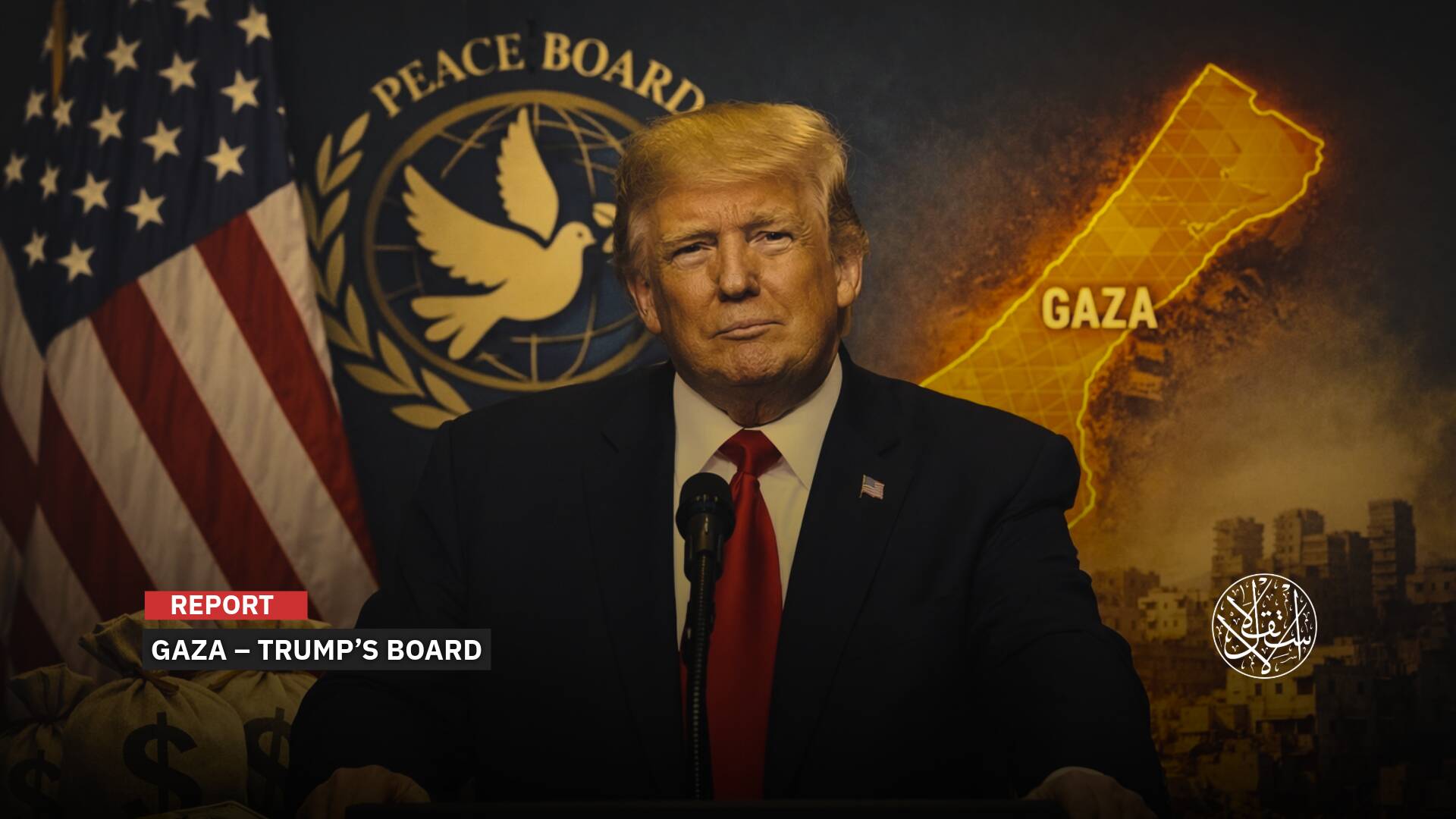Dilemma of Turkish Maritime Demarcation; Egypt and Palestine in Exchange for 'Israel'

Contents
Introduction
First: Israeli Motives
a. Growing Turkish Power and Its Repercussions
b. The Political Intelligence Consensus in ‘Israel’ Regarding Turkey
c. The National Council of Turkish States and Its Effects
d. Possibilities of Turkish–Egyptian Rapprochement
Second: The Turkish Position and Its Motives
a. Repercussions of Biden's Victory
b. Avoiding a Clash With Egypt
c. Empowering the Palestinian Authority
Conclusion
Introduction
In light of many facts, the Israeli intelligence agency (Mossad) moved to push Azerbaijan towards a mediation with Turkey, in which "Tel Aviv" tried to exploit Ankara’s feverish efforts to explore for gas in the eastern Mediterranean, and then pushed it towards demarcating maritime borders.
Indeed, Azerbaijan carried the message attached with the map in which the proposed borders from "Tel Aviv" pass in the southwest of western Cyprus, referring a sector that exceeds 55 percent of the wealth acquired by Cyprus to “Israel” after the agreement demarcating its maritime borders with “Tel Aviv,” while Turkey obtains about 40 percent of this wealth.
But most importantly, this step would have led to the collapse of the two jurisdiction agreements related to setting the Egyptian maritime borders with both Cyprus and then Greece, according to observers.
In mid-December 2020, this call came out of the intelligence corridors into the public, when the Turkey Scope publication, affiliated with the Moshe Dayan Center for Middle Eastern and African Studies at Tel Aviv University, published a research paper that called on both "Tel Aviv" and Ankara to negotiate a separate agreement for the maritime demarcation borders between them.
Which practically meant excluding Cyprus from the gas project to a large extent, and giving “Israel” an opportunity to achieve full sovereignty over the resources of the Aphrodite gas field. Arab newspapers affiliated with the UAE axis published that the offer was in fact a Turkish offer, and that it was under discussion with the formation of the new government in “Tel Aviv.”
Turkey's approval—which did not take place—on such an agreement would have restored “Israel” an area of about 4,600 km that it lost in the border demarcation agreement with Cyprus, and an additional 12,000 km above it. Turkey will get about 10,000 km of gas fields with detailed maps without the trouble of seismic research and geological survey efforts.
The aforementioned proposal came within the framework of a change witnessed by the head of the Mossad, as its former head, Yossi Cohen, is heading to assume a declared and political role in public life; meanwhile, a new figure assumes the head of the intelligence agency, David Barnea, who has a vision that stems from the necessity of deepening "Tel Aviv" relations with Ankara, a vision behind which are several security, intelligence and even economic considerations that will be mentioned in due course.
What are the goals that "Tel Aviv" envisaged as a result of such a proposal? What are the Turkish reactions to it? What are the pillars on which the Turkish decision was based?
First: Israeli Motives
Of course, we cannot evaluate this proposal by today's standards, as it is the result of its circumstances. During the period in which "Tel Aviv" submitted this proposal to Ankara, Egypt at that time has conflicts with Ankara, and lined up within the framework of the French-Greek axis; To confront it and limit its efforts to extend its regional influence, especially on the Libyan stage, which is the most important consideration for Cairo.
On the other hand, Turkey had signed with the (former) Libyan Government of National Accord (the former) internationally recognized government headed by Fayez Al-Sarraj, a privatization agreement to define the maritime borders between the two countries, an agreement that Egypt participated in rejecting, although it granted it a maritime concession with a range of about 11,000 square kilometers. This is in addition to the negative presidential mutual positions between the Turkish and Egyptian parties.
In this context, Tel Aviv was not involved - as was Cairo - in a strong geopolitical challenge relationship with the Turkish state, as Tel Aviv was keen from the beginning to leave a clear distance between it and the path of this alliance, contrary to what we see in the strategic scene in the eastern Mediterranean Today, in which it can be said that "Tel Aviv" is trying to replace Cairo in security arrangements that bring it together with Greece and Cyprus, arrangements that represent an extension of attempts to isolate Cairo from the plan to exploit the Eastern Mediterranean gas, and Turkey was the only factor that stopped its repercussions represented in The EastMed gas pipeline, which was inaugurated by the "Israeli" - Greek - Cypriot trio.
This line, which ignored Egypt, was supposed to transport gas from the eastern Mediterranean to the north. Within the framework of that distance that "Tel Aviv" was keen to leave, its attempts to infiltrate the Libyan gas sector were not under the French flag, which was fighting the Turkish flag in Libya; Despite the efficiency of French - "Israeli" relations.
Rather, the infiltration was in the midst of an agreement with the Russian bear, which at the time was playing a prominent role in the Russian scene, an agreement that began in Syria, and continues to this day; As its repercussions on Russian-Iranian relations are apparent.
In this context, Tel Aviv's motives for this proposal can be clarified as follows:
A. Growing Turkish Power and Its Repercussions:
From an economic point of view, the expansion of Turkish influence in the eastern Mediterranean, which led to the obstruction of the project to transport gas discovered in the eastern Mediterranean to southern Europe, and from there to the rest of European countries, led to Tel Aviv reviewing its relationship with its partners in the eastern Mediterranean gas trinity, Greece and Cyprus, and prompted them to search for a way to benefit from this wealth, which is estimated at between 3.6 trillion and 6 trillion cubic feet of natural gas, which has been disrupted due to the Turkish geopolitical situation.
The goal of Tel Aviv's move in this area was on the one hand to increase the level of wealth that would be available to it as a first path; This is due to the Cypriot gas that will accrue to it as a result of the demarcation of the new maritime border with Turkey.
Here, it should be noted that the secret of Tel Aviv's coup against Cypriot rights in the gas fields in the eastern Mediterranean was that the border demarcation agreement between it and Cyprus was signed in 2010; Before the full discovery of the field's reserves, which later turned out that the entity owns about 10% of them, with a selling value of more than 1.5 billion dollars, in the Yishai field, which was pushing Tel Aviv to renegotiate, or to search for other ways to compensate for what it lost, in addition to the consensus that can be generated from such a demarcation between Turkey and "Israel"; It includes Ankara's permission to implement the "EastMed" pipeline project, which represents a double-win for Tel Aviv.
Italian Foreign Minister Luigi Di Maio said: "When we take into account the cost of establishing and implementing this project, it is clear that this project that Greece has proposed to implement will not be a good option in the medium and long term when compared to other projects."
Di Maio explained the huge rise in cost by excluding Turkey from participating in its implementation, which increases the length of implementation and raises its cost.
Studies in this file indicate that Israel’s share of such a deal will rise from about 10 percent of the total wealth in the border areas to about 60 percent, compared to 40 percent that goes to the Turkish side, and it will be directed mainly for internal consumption, so that Turkey will suffice to buy 80 percent of Its energy needs are from Russia and Iran.
B. The Political Intelligence Consensus in 'Israel' Regarding Turkey:
It seems that there was agreement between Benjamin Netanyahu and the new "Mossad" Minister "Daoud Barnea" on an old perception that the necessity of "Israeli" openness to Turkey, and that the strategic alliance between Ankara and "Tel Aviv" in the Middle East, which was reinforced by their goal, is to limit influence.
Iran and preventing other Arab countries from lining up against them will protect the relations between Ankara and Tel Aviv from "external shocks."
As previously reported by the Stratfor Center in an assessment published in early October 2018, it emphasized the intensified US efforts to find regional allies that it can rely on to contain Iran, which would keep the two countries close.
This proposal was accompanied by a recommendation that Tel Aviv seek to block the roads leading to any possible Turkish-Iranian rapprochement, especially with regard to the repercussions of this rapprochement on what Tel Aviv considers internal security related to Jerusalem and other issues of occupied Palestine.
It seems that this approach is proposed by the administration of US President Joe Biden itself, because Saudi Arabia participated in Tel Aviv in this approach, in what was soon known as the possible "Turkish-Saudi reconciliation" that is facing a dead end today and indefinitely.
The Saudi monarch, King Salman bin Abdulaziz, had asked Turkey for indirect support in the Yemen war, which he hoped would complicate Ankara’s calculations in communicating with Iran, a project rejected by Saudi Crown Prince Mohammed bin Salman with a strong resistance that reached the point of participating in the war. Military exercises with Greece near the Turkish border.
It should be noted in this regard that the Turkish-Palestinian relations were witnessing rapid positive developments, whether with the Palestinian Authority or the Islamic Resistance Movement Hamas.
Linked to this positive development was Tel Aviv's apprehensive attitude towards the practically qualified Turkish force compared to Jordan, or even Saudi Arabia, from being a reference regarding the future of the Holy City, especially with the high-ranking Turkish officials' constant emphasis on supporting the Palestinian cause.
In view of Tehran's initial position on this issue, and the state of hostility between it and Tel Aviv, which targets Iranian influence and weapons, it was natural for the "Israeli" strategic mind to go - as we have seen - to the necessity of preventing the agreement of the Sunni (Turkey) and Shiite (Iran) references, on one approach with regard to the issues of occupied Palestine; Especially the issue of sanctities.
C. The National Council of Turkish States and Its Effects:
This trend is linked to what the emerging Turkish National Council represents from the strategic depth of Turkey, which may give it greater strength, and more ability to crystallize the Sunni reference to the Islamic world around it, which began to be disturbing with the legendary receptions that Turkish President Recep Tayyip Erdogan received during his visits to major Islamic capitals such as Pakistan, Azerbaijan and Malaysia.
Talking about Turkey as a reference in this context is related to the various considerations that made it take the lead in the military scene of the Islamic world due to the developments of its technical and economic bases on the one hand, and the advancement of the level of its defense industries on the other hand.
Also because of its active military capabilities, which have passed multiple tests in different climatic and topographic centers, including the liberation of Tripoli and then “Karabakh,” as well as its confrontation with the Russian bear in northern Syria, and finally confronting Moscow in southern and eastern Ukraine.
Within this framework of the leadership components, the Arabic language will not be an obstacle to the crystallization of this reference in favor of Turkey, due to two factors. The first is the historical consideration related to the Ottoman Empire, and the second is related to the numerical criterion in which the proportion of Arabs to all Muslims has shrunk to about 25 percent, which prompted international observers to question the future fate of the Organization of Islamic Cooperation with the development of the Turkish move in this regard.
Observers point out that "Tel Aviv" counts Palestinian President Mahmoud Abbas today on the Turkish side, and sees that he finds no objection whatsoever to him handing over influence in the holy city to Turkey.
In this context, it should be noted that the Turkish reference in relation to the occupied Palestinian territories is not limited to Turkey’s representation of the Sunnis and the community, which dominates the composition of Muslims around the world (between 85-90 percent of Muslims legalize the Sunni sect of the Islamic religion), as it exceeded; It is the representation of Muslims to represent the Jews of Turkey as well.
In the context of representing the Jews of Turkey, the weekly newspaper "Salom,” which expresses the Jews of Turkey, published an article stating that the Turkish Jews are demanding Erdogan and the Turkish state to restore some Jewish places in the holy city, and they point to the continuous role of Ankara with the Ottoman role, which historically contributed to securing these places.
D. Possibilities of Turkish–Egyptian Rapprochement:
The desire to prevent a Turkish-Iranian alignment also extends to the possibility of a rapprochement with Egypt, though from another angle it is called for by the circumstances of the Eastern Mediterranean. There is a realization in "Tel Aviv" that any strategic review in the two countries of the course of their relations and the repercussions of this path; That would lead to a rapprochement to one degree or another, which began in April, before relations tended to decline later due to the pressures of the Emirati-Saudi-Israeli triad.
The efforts of the Egyptian-Turkish rapprochement were related to Egypt’s reservations about being drawn into an actual confrontation with Turkey in the eastern Mediterranean or even in Libya. This is in addition to the impact of the Turkish policy, which led to a tendency among the Egyptian state institutions to prefer building positive relations with "Ankara" compared to "Athens" and even "Tel Aviv.”
On the other hand, there is a Turkish initial reservation about reaching a state of confrontation with any Muslim country that does not engage in direct conflict with it. This spirit would lead to a rapprochement in the future.
This may result in the convergence of the two most important powers in the eastern Mediterranean to build a unified position towards "Israel" and its relationship with occupied Palestine. This was what the Turkish President was thinking in particular as he responded to the proposal.
Second: The Turkish Position and its Motives
Briefly saying that Ankara rejected the proposal submitted to it by “Tel Aviv,” the Turkish position in the eastern Mediterranean in general and from Tel Aviv in particular moves according to several motives, the most prominent of which are:
A. Repercussions of Biden's Victory:
With Biden's victory confirmed, Erdogan announced that his country desires better relations with “Israel,” he revealed that talks at the intelligence level are continuing in this regard.
On the other hand, sovereign sources closely linked to “Tel Aviv” published extensive press leaks, attributed to high-ranking “Israeli” officials that “the two countries are about to overcome their differences to the point of re-exchange of ambassadors.”
The estimate of the Turkish position is due to the nature of the difference of Joe Biden from his predecessor, Donald Trump, and Turkey's weak ability to maneuver in front of the sensitivity of the United States' position on Turkey's purchase of the Russian “S-400” missile systems.
This means that Biden's success in repairing the rift that Trump left with the European Union, may also mean the possibility of his success also by tightening sanctions from NATO and Brussels on Turkey.
This is in addition to Turkey's need to avoid the increasing level of rapprochement between the Biden administration and the Kurds in Syria, which would confuse its calculations in northern Syria.
Also, the paper of “Fethullah Gulen” (a resident of America and accused of masterminding the failed coup attempt in Turkey 2016), and the impact of its potential employment on political stability in Ankara.
These considerations prompted “Erdogan” to identify and beautify the calm front with “Tel Aviv,” it is clear from these considerations that his destination is not related in any way to his refusal to demarcate the maritime borders with “Tel Aviv,” which opens the door to question the rest of the considerations that led him to this refusal.
B. Avoiding a Clash with Egypt:
Despite the high degree of military readiness of Turkey, but it wishes to de-escalate the conflict in the eastern Mediterranean, and curbs the possibility of it reaching the point of total confrontation, in addition to its desire not to exhaust the forces of the Islamic world in “useless confrontations,” this led to a joint avoidance of a military clash between Turkey and Egypt.
In this context, the Turkish administration began to think seriously about pushing the tension with Egypt to its lowest level, and exerting efforts to embarrass Egyptian President Abdel Fattah El-Sisi in front of the Egyptian state institutions in this regard, this means eliminating the possibility of Egyptian participation in the efforts to recharge the conflict atmosphere in the eastern Mediterranean.
Therefore, it was necessary to avoid provoking Egypt by agreeing to such an agreement, especially since it affects the interests of Cairo to the east of the 26th longitude line, which could have caused the collapse of Saudi-Egyptian relations, after the military protocol signed by Riyadh with Greece as a framework for the joint exercises that took place between them in March 2021.
With a little reflection on the available map of the proposal submitted by “Tel Aviv,” we find that the southern line of the proposed border vision clearly intersects with that area proposed by the Egyptian Ministry of Petroleum for exploration in a “public tender,” it is in which the ministry has avoided expanding the scope of exploration, in order to avoid touching the area that is the subject of dispute between Turkey and Greece, the Turkish institutions’ speech in it led to an atmosphere of optimism about an “imminent Egyptian-Turkish rapprochement.”
The equation as seen by the Turkish side in this context: How is it profitable for Turkey to have an area of 10,000 square kilometers of gas fields, if you were to spend it on a military confrontation that would drain the energy of the two largest Muslim countries in the eastern Mediterranean? This makes the Turkish strategic goal to start demarcating the border with Egypt.
Egypt sees in this tendency a “new possibility” to regain its lost share in the “legitimacy gain negotiations,” in which it was forced to sacrifice its rights in a sector of the gas wealth of the eastern Mediterranean, you also see in this convergence an opportunity to re-brand the idea of a gas liquefaction center, which was previously the “East-Med” agreement that removed Egypt from it.
We must point out here that this mission is supervised by Mahmoud Hegazy, El-Sisi's son-in-law, and his son, Hassan El-Sisi, therefore, the tendency to recover this possibility enjoys partial support from the military establishment, which previously lost a large share of the energy profile and its internal distribution to the UAE sponsor.
C. Empowering the Palestinian Authority:
Turkey has a vision of empowering the Palestinian Authority and promoting internal reconciliation, empowering itself as the “regional power” that was able to impose one of the foundations of consolidating Palestinian financial independence, and building a negotiating speech in this context on the basis of a return to the Arab initiative launched by the late Saudi King Abdullah bin Abdul-Aziz.
In the reading of observers affiliated with the Turkish speech in this file, the Turkish administration is seeking to promote the path of demarcation of the maritime border between Egypt and the Palestinian Authority, with what goes into the box promoting international recognition of the latter.
In the same context, on the Egyptian side, Palestinian economic officials are talking about that the consultations with the Egyptian side have not yet taken a “serious nature,” and it cannot be said that there is a “strong political will” from Cairo to sign such an agreement.
In another context, the Egyptian narrative sees advanced contacts between the Turkish and Palestinian sides regarding the “maritime border file,” and that these negotiations revolve around the possibility of reaching an agreement on demarcating the borders of economic waters with the Palestinian Authority, similar to the one signed between Turkey and the Government of National Accord in Libya.
In addition to the possibility of injecting Turkish investments in the “Gaza Marine” field, which was discovered in the late 1990s, which lies entirely within the Palestinian territorial waters near Gaza City, the second Palestinian field, “Mari B2,” is located within the maritime border area between the Gaza Strip and the occupied Palestinian territories.
The two fields remained without development or exploitation until today, the British company has determined the amount of gas in the Gaza Sea at about 1.4 trillion cubic feet, that is enough for the Gaza Strip and the West Bank for 15 years, according to current consumption rates.

The Egyptian narrative about the competition with Turkey faces a problem that makes its acceptance subject to review, except in one case, the Turkish state, which seeks to exploit the Palestinian gas fields, has the right to exploit in the Mediterranean an area “more than 27 times the size of the Gaza Strip itself,” in addition to the area of its maritime borders, the area of the sector is 360 square kilometers, whereas, the area that Turkey was expected to obtain when demarcating the border with “Israel” is 10,000 square kilometers.
More importantly, in this context, this area is the result of an agreement with “Tel Aviv,” which has the power to pass this agreement in front of the USA and the European Union, which means that an agreement will come at a “diplomatic cost that is not high.”
On the other hand, Ankara is negotiating with “Tel Aviv” today to buy a share of its electricity production, to direct it to the Palestinian territories, but this was met with a “triple request” from Tel Aviv, Athens and Nicosia, in order to exchange this request with a triple request related to the Turkish permission to pass an electric cable.
As, the three mentioned countries had signed on March 8, 2021 a “memorandum of understanding” regarding it within the context of the project to link the electricity networks of the three countries through “submarine cables” with the support of the European Union.
Turkey had requested the necessity of obtaining permission from it, if these countries wanted to pass this cable across the Turkish continental shelf, Ankara preferred - in this context - to directly purchase the share of electricity necessary for the consumption of the Palestinian territories with Qatar, without exchange or compensation may affect its continental shelf.
This negotiating path on the cable route carries two implications that are indirectly related to the case of the demarcation of the proposed border, and its relationship to the demarcation of the Egyptian-Palestinian maritime borders.
The first is that there is a “moral obligation” that moves the Turkish state towards the Palestinian file, it is an obligation that Ankara wishes to finance in cash, without affecting its continental shelf.
This supports the credibility of the ethical framework related to its desire to advance efforts to demarcate the Palestinian-Egyptian maritime borders, without intentions to exploit Palestinian gas wells.
The second is that the Turkish endeavor to explore for gas in the eastern Mediterranean, it is related to the necessity of providing a framework for the legality of its activity on the one hand, and without losing an “important potential ally” like the Egyptian side on the other hand.
Conclusion
After the expansion of the discoveries in the eastern Mediterranean and the awareness in "Tel Aviv" of the extent of the loss it suffered as a result of its early signing of the border demarcation agreement with Cyprus, the Israelis turned to search for a way to compensate for this loss, which led the think tanks there to devise the idea of demarcating borders with the Turkish side, leading to the practical cancellation and reconsideration of the agreement signed with the Cypriot side.
However, the calculations of gain and loss were not the incentive of the Turkish decision—as it is for the “Israeli,”—but two considerations were added to the determinants of the Turkish decision; the first is strategic, related to its desire to undermine the process of mobilization for confrontation in the eastern Mediterranean by removing Egypt from this equation, and the second determinant was morally represented in working to advance the efforts to demarcate the Egyptian–Palestinian maritime borders, which leads to addressing the energy problem in the Palestinian territories.
This did not prevent the Turkish position from seeking to invest in the "Tel Aviv" proposal in order to produce an atmosphere of rapprochement that Turkey could benefit from in the face of pressures from the administration of the new American president.
Turkey is contingent on its desire to obtain stable gas resources on the necessity of providing a framework of legality governing these resources, as well as pressure for the recognition of its legitimate rights to own these resources; in a way that erodes the mobilization fuel for conflict in the eastern Mediterranean.










